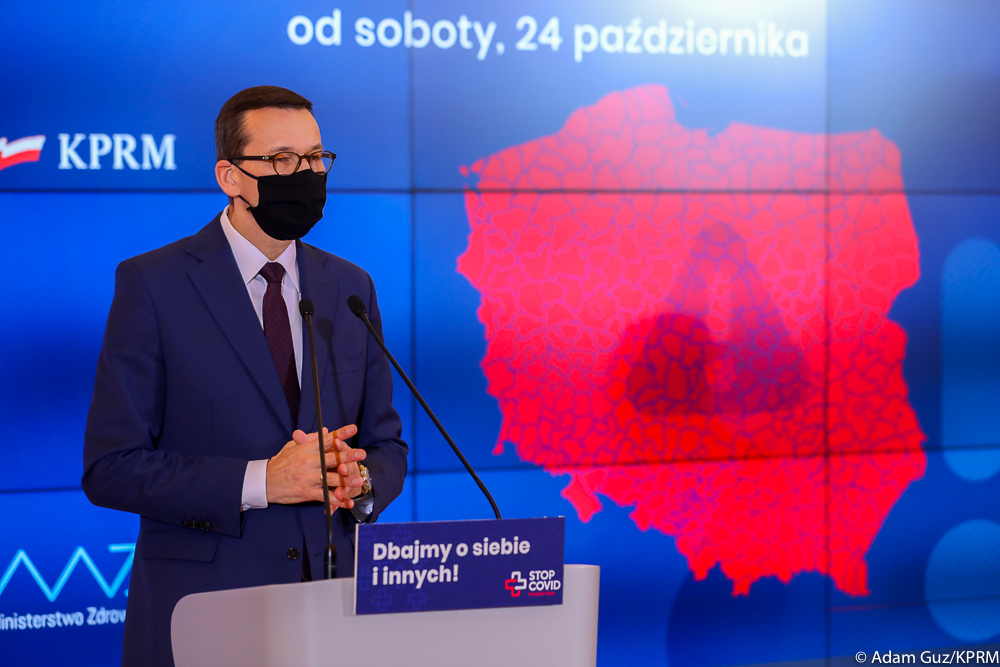By Aleks Szczerbiak
A perception that the health service is not coping effectively with the second phase of the coronavirus pandemic will lead Poles to seriously question the right-wing ruling party’s claim to be handling the crisis competently.
A major economic downturn precipitated by government lockdown restrictions would also make it increasingly difficult for the governing party to deliver on the hugely expensive but extremely popular social spending and welfare spending programmes that are a core element of its appeal.
The pandemic issue re-emerges
Poland appeared to pass through the first phase of the coronavirus pandemic crisis relatively mildly, experiencing very low rates of virus-related deaths compared to other European countries.
The Polish government – led, since 2015, by the right-wing Law and Justice (PiS) party – introduced extremely radical “lockdown” restrictions in early March (even denying Poles access to woodlands and forests!) but started to relax these measures quickly at the end of April with further easing in May and June.
Having spent 145 billion zloty (€32 billion) on so-called “anti-crisis shields” providing liquidity support and business aid to encourage firms to maintain jobs, the government’s primary concern began to switch to the broader socio-economic impact of its lockdown restrictions.
PiS wanted to move on from the pandemic issue and open up the Polish economy as much as possible before the summer holiday season got underway. Moreover, with a crucial, delayed presidential election taking place in July – won, in the event, by PiS-backed incumbent Andrzej Duda – the ruling party was keen to give the impression that it had dealt with the pandemic crisis successfully.
In particular, PiS wanted to encourage older voters – a core element of its electoral base, but who felt especially vulnerable to the virus and, therefore, reluctant to venture out to polling stations – to turn out and vote for Duda in what was an extremely closely-fought electoral race.
However, last month the pandemic issue moved back to the top of the political agenda when the Polish government was taken aback by sharp rises in: positive coronavirus test results (albeit following a large increase in the number of tests), the number of hospital beds and ventilators being used by virus patients, and deaths linked to the virus.
PiS came under increasing political pressure to be seen to be taking action in response to media reports that the crisis was running out of control and overloading the Polish health service. However, it was also concerned about the broader socio-economic impacts of introducing tougher lockdown restrictions.
Consequently, the government argued that it was trying to steer a middle course aimed at introducing measures to try and control the spread of the virus while avoiding shutting the country down for a second time in order to protect the economy and keep society as open as possible.
As a consequence, although the measures introduced so far fall short of the full-scale lockdown imposed in March, the government has tightened its pandemic restrictions on a number of occasions in October.
These restrictions include: making the wearing of face masks compulsory in public spaces; closing fitness clubs and swimming pools; banning wedding parties; imposing more curbs on the number of people allowed to enter shops, use public transport and attend religious services; moving universities, secondary schools and classes for older children in primary schools back to online teaching; limiting public gatherings of more than five people and requiring children to be accompanied by an adult when outdoors; shutting down bars and restaurants (except for those selling takeaway meals) for two weeks; instructing the over-70s to stay at home; and closing cemeteries during the the All Saints’ Day weekend at the beginning of November when millions of Poles traditionally visit graveyards to pay their respects to the dead.
The government also announced plans to: build new hospitals, provide financial incentives for doctors to treat coronavirus patients, and, knowing that it could not afford another nationwide anti-crisis aid programme, provide targeted financial help to particular sectors.
An opportunity for the opposition?
The revival of the coronavirus issue has provided the opposition with an opportunity to go on the political offensive and accuse the government of being complacent and wasting the summer when it should have been preparing better for the second phase of the crisis.
The opposition says that PiS declared a premature victory over the pandemic – citing quotes from Prime Minister Mateusz Morawiecki in July that the virus was in retreat and Poles no longer had to fear it; a claim, which, it argued, undermined his subsequent credibility when trying to persuade Poles to observe the new coronavirus restrictions.
The opposition also accused PiS of spending too much time during the summer on a government reshuffle and internal squabbles within the ruling camp when it should have been focusing on preparing the health service for the autumn crisis.
However, notwithstanding its perennial calls for a more effective testing system, the opposition’s weakness is that its arguments are rather vague on what exactly the government should have done to prepare for the autumn and should be doing differently now. The logic of the opposition’s critique inevitably leads it to call for even tighter restrictions, and even a return to a full lockdown, but it has been reluctant to do so explicitly.
Interestingly, opinion polls suggest that support for further restrictions is actually slightly higher among PiS voters than supporters of the main opposition parties.
On the other hand, some critics of the government’s approach – including the radical right Confederation (Konfederacja) party, but also a number of conservative commentators generally sympathetic to PiS – accuse it of over-reacting to political and media pressure and introducing harsh restrictions with huge social, economic and broader health consequences without any clear long-term strategy for managing and exiting the crisis.
PiS responded by accusing the opposition of point-scoring and trying to politicise the crisis. It cited quotes from Borys Budka – the leader of the liberal-centrist Civic Platform (PO), Poland’s ruling party between 2007-15 and currently the main opposition grouping – from earlier in the year that the autumn would actually be the best time to hold a re-scheduled presidential election as the pandemic would be in retreat by then.
PiS argued that the health service had faced years of neglect and under-funding by its PO predecessor which the current government had been steadily trying to remedy by increasing expenditure systematically over the last five years, and pledged to do so even more in the future.
It also accused the opposition of supporting demonstrations led by pro-abortion activists involving thousands of young people protesting against an October ruling by the constitutional tribunal that terminations due to foetal abnormalities (which make up the vast majority of legal abortions in Poland) violated the Constitution – arguing that these protests contravened pandemic restrictions and posed a potential health threat to the elderly.
For their part, the opposition, which refused to recognise the tribunal’s legitimacy, argued that PiS had taken advantage of the pandemic crisis, when Poles could not gather legally in mass protests, to force through the abortion ruling. They also accused the ruling party of orchestrating the tribunal ruling to distract Poles from the fact that the government was failing to tackle the pandemic crisis effectively.
Undermining the government’s claims to competence?
The revival of the coronavirus pandemic crisis as one of the main political issues in Poland is a serious threat to PiS, both in the short-term and long-term.
In the spring, PiS benefited from what political scientists call the “rally effect”: an inevitable psychological tendency for worried citizens to unite around their political leaders and institutions as the embodiment of national unity when they feel that they face a dramatic external threat. The government also gained politically from the fact that it was felt to have handled the first phase of the pandemic crisis relatively well.
However, given that public health is such an incredibly emotive, high-stakes issue, the ruling party will be held to account ruthlessly for any perceived shortcomings in its handling of the second phase of the crisis, particularly if it is felt that the Polish health service is not coping effectively.
The government was clearly taken aback by how quickly the crisis developed in the autumn and there were widespread media reports that patients were suffering due to the fact that respirators or other medical apparatus were missing or not in the right places.
PiS argues that Poland is not the only country struggling to deal with the resurgence of the virus and that Polish hospitals can cope. It is increasing the number of hospital beds and respirators for coronavirus patients and building temporary medical facilities, including turning the national stadium in Warsaw into a field hospital.
However, it is unclear how the government will manage to find the doctors and nurses required to staff the temporary hospitals given the huge skill shortages in the Polish health service. PiS leaders also accused some doctors of exacerbating this problem by refusing to work with coronavirus patients.
An autumn health crisis and perception that the Polish service was not coping effectively thus has the potential to seriously undermine PiS’s reputation for competence which it has been working extremely hard to establish over the last five years to counter opposition criticisms that it is a party obsessively pursuing a narrow ideological agenda.
Many Poles also feel misled by the government’s optimistic statements about the retreat of the pandemic in the late spring and summer. Worryingly for PiS, the CBOS polling agency found that the number of respondents who approved of the government’s handling of the pandemic crisis fell from 70% in May/June to only 49% in September/October, while the number who disapproved increased from 25% to 43% over the same period.
Moreover, the fact that the second phase of the pandemic crisis has coincided with mass protests over the hugely controversial and divisive abortion issue means that PiS now faces the prospect of an accumulation of political crises coming together at the same time. Although most Poles are not in favour of liberalising the country’s restrictive abortion law, a majority, including many PiS supporters, oppose the constitutional tribunal’s ruling and further restrictions.
Threatening PiS’s core appeal
In the long-term, the damage from a major recession precipitated by the various government restrictions increasingly taking their toll on the economy, and strain on the public finances arising from the costs of the expensive support packages, will make it increasingly difficult for PiS to deliver its generous social spending and welfare policies; which could, in turn, lead to an electoral backlash against the ruling party.
Up until now, a core element of PiS’s appeal has been its claim to have delivered a programme of hugely expensive but extremely popular fiscal transfers to the less well-off while maintaining economic growth and without increasing the state budget deficit. Indeed, the party’s critics argue that one of the reasons why the Polish health service remains under-funded and under-staffed is because the Law and Justice government has neglected it in order to finance its social spending and welfare programmes (a claim which the ruling party vigorously denies).
However, the dilemma that PiS now faces is that while it knows that another full lockdown would paralyse the Polish economy the logic underpinning its claim to be taking the crisis seriously and not losing control of the pandemic could inevitably push the government (however reluctantly) into introducing increasingly radical restrictive measures that would bring about precisely such a deep economic slump.





















